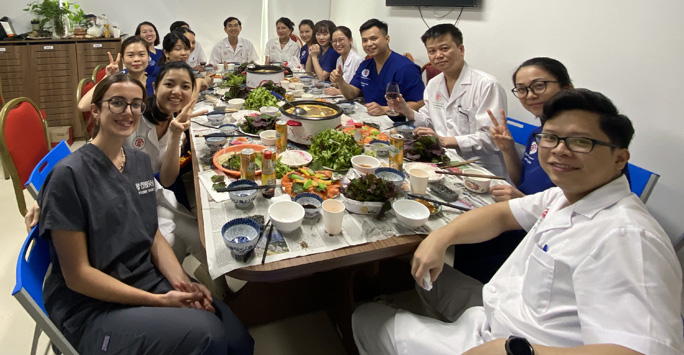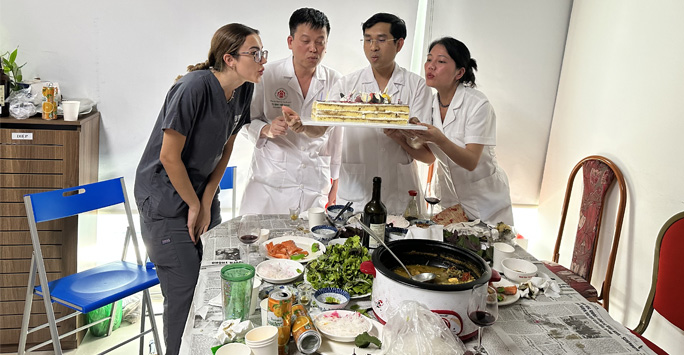
As part of the MBChB programme, fourth year student doctors embark on a four-week Elective placement which serves to expand their skillset and knowledge in a particular area of medicine. Student Doctor Semay Baydar immersed herself in a brand-new country, travelling to Vietnam to undertake her placement in a busy Ophthalmology department.
Semay shares how her experience has contributed to her professional growth as a student doctor, as well as her delight at coming first place in the Elective Photo Competition and receiving a £150 cash prize for her winning photograph.
Where did you spend your Elective?
"My elective was in a military hospital in Hanoi, in the north of Vietnam. It’s also the capital city of Vietnam as well. We were a group of six girls, and we chose to travel there a couple of days before our placements started to settle in; and then we got straight into it for four weeks. I did my placement in the Ophthalmology department, but some of my friends split their time with two weeks in one practice and then two weeks in another.
What led you to choosing to do an Elective?
I was in Second Year and speaking with one of my friends who's two years above me. She'd been to Malaysia, and she was just so enthusiastic about how positive an experience it was, which is something I noticed generally from peers.
Every doctor that you meet on placement, as soon as they hear you're in Fourth Year would follow it up with “the elective is the best part of medical school.” And, with reflection, they are right. It is so nice to be able to go somewhere completely different and get the opportunity to do a working placement there - when else are you going to get to do that in your career?
We’re incredibly fortunate it’s a part of the course and an opportunity open to us. The ability to be immersed in a different culture and join their health system for four weeks is fantastic.
How did you settle on Vietnam?
I really wanted to travel somewhere new, somewhere I hadn't been before and where healthcare was going to be very different to anything I'd seen - that meant going out of Europe. I'm Turkish and I lived there until I was 11, so I already had exposure to some healthcare in the Middle East. So, I thought Southeast Asia or East Asia was going to be where I wanted to go. I knew I wanted to go with friends, and at the start we had a discussion looking at places we all liked the idea of. We also spoke to some people who have done their electives in Southeast Asia.
We weighed up our options and we just thought Vietnam was where we wanted to travel to. Also, the fact that one of our options was a military hospital – that just felt so different to anything we've seen before!
What was a working day like?
Vietnam is very different, particularly their daily schedule in terms of practice and ward rounds. They would start very early, around 7am for surgery, and then they would have a midday nap at 12pm. Literally the majority of hospital - lights out across the whole building - until 1pm, and then they would have a one-hour lunch break and start working again at 2pm. The only people who stayed awake were the A&E Department, and anyone involved on-call with a bleep. Every office had bunk beds in them – which wasn’t something I was expecting!
But the climate there necessitated it, in terms of keeping people cooler during working hours and their commutes. The same thing applied on night shifts – a lot of the doctors would go swimming mid-shift as a break to cool down. A lot of things were similar to our practice here in the UK though, medically speaking. We were able to observe some surgeries and the doctors involved there wanted to know our qualifications, so they could point out the common areas of practice. 
Where there any difficulties or barriers to practicing?
We had to shadow the doctors there mainly because a lot of the population of Vietnam can't speak English. You always needed someone to translate for you, so I just followed their working schedule with them so I could communicate with patients. But outside of work, you could get by using things like Google Translate, to find where you needed to be or to speak with locals.
I think the most striking difference was the fact that the hospital that I went to was a military hospital, but it was both public funded and private funded. There was a huge disparity in terms of waiting times and provision of care compared to the public side; and the private side was completely free for all military personnel and their families. The private section was much more ornate & reflected what we might expect working here in the UK. Whereas the public side was much more of a basic room, like an A&E waiting room, with fewer doctors and a lot more people. I’d never really seen that before – and it reinforced how different healthcare can be in developing countries compared to our own.
What learning outcomes did you take from your time there?
I think it's the best thing I've ever done, it's added so much more to me as a person and broadened my career horizons as well.
I think seeing the difference in health care in a developing country, really put things into perspective for me in the sense that the way I connect, the way I have the power to help people, is so different than I would in any other profession. And I think it's just made me into a better person being able to travel and being able to connect with different people in different cultures - I found it very enriching.
What was the experience like outside of practice?
Vietnam is such a beautiful country; I wish I had more time to do even more than I did! We were based in the very far North, and on our days off we’d take a trip and make our way further South to explore. Everything you saw along the way was just incredibly beautiful - the beaches, the cities – it has everything that you could want to see.
The people too are generous and hospitable. Whenever they see a tourist, they would always stop and ask ‘Where are you going? Do you know where you're going?’ and offer to help or check your map, or guide you to the train stations, it’s a very warm & relaxed culture. The midday nap is widely practised too – I think their approach to work/life balance for citizens was very positive. Wellness and relaxing are a key part of their culture, looking after one another, but ensuring you were always at your best to help.
It was an ideal scenario really because you became so immersed in the culture by living there: the food, the transport, local people – you get so much more of a rounder experience of their culture and way of life than if you just visited on holiday.
Did you have any tips for prospective Elective students?
Be as pro-active as you can and email the Electives team (link). I spoke with them and asked if they had a list of contacts for Vietnam, and they responded with over a hundred places. I emailed them all, maybe half replied, and of those we got back maybe a third were free placements, so we pursued those for confirmations.
Look to travel if you can; obviously financially it isn’t viable for everyone to go abroad, but if you can, try and immerse yourself in another culture. In terms of my experience, Vietnam is right in the centre of Southeast Asia, and flights were the most expensive part of getting there, so book them early and use transfers to make them cheaper if you can. Equally, flights between countries when you are there are very cheap – you can book them out there after you know your timetable. We went to Malaysia and Singapore for weekend breaks and that was amazing, just seeing all those places and doing it with my best friends.
Check your accommodation has a kitchen if you’re travelling abroad, as you might not be fully on board with all the local food when you first arrive. Also send reminder emails. We received our confirmation in January and didn’t travel until July, so every month or so I would contact the hospital just to double check and update them on where we were with travel arrangements. Lastly, it’s a basic one but, we backpacked there – so by the end of placement we were saddled with a lot of stuff we were bringing back. Plan some empty luggage space in if you want to bring back some gifts! 
Your winning photo from the Elective Photo Competition was very interesting – could you tell us a little more about it?
My photo was taken at a birthday party at lunchtime, and they told me that this was happening a couple of days before. Three of the staff, two doctors and the Head of Department have birthdays in August, so they combined their celebration into one lunchtime. Everyone who comes brings their own little bit of food, hot pots and different things.
They asked when my birthday was, and it also happens to be in August and, coincidentally, the exact same day as the Head of the Department’s! So immediately they said it was my birthday too, and that I had to make sure I attended. We had theatre in the morning and then they whisked us off to the canteen area at lunch. We were really good friends by this point, but I still felt a little out of comfort zone. I didn’t know what to expect, I thought maybe just a few snacks or everyone bringing their own lunch, but there were two full hot pots, and a big array of local dishes, and I didn’t have to make a thing. Everyone kept handing me local things to try, and then they brought a cake out with four candles – one of which was for me!
It was genuinely a real moment of reflection for me where I felt I was truly part of the team. Half the people in the room couldn't speak any English, but the way we were communicating was more than just speaking.

I get emotional thinking about it. I didn't even know how to eat some of the things there or how to cook them and I just felt really shy. But they just kept handing me things and asking, “which one do you prefer” and “which one is your favourite? We’ll get you more of this.” They really made me feel I was a part of their team and at the centre of their celebration, and that meant a lot being in an environment that was so far removed from my comfort zone.
But that inclusion, particularly around food, was true of all my placement – my pockets were always filled with snacks by the nurses. Even the day I left for the airport they gave me a bunch of snacks and said, “This is for the airport.” We didn’t go hungry!"
Discover more
- Planning for your Elective this year or in future years, head over to the Electives section of the student intranet (link) for support.